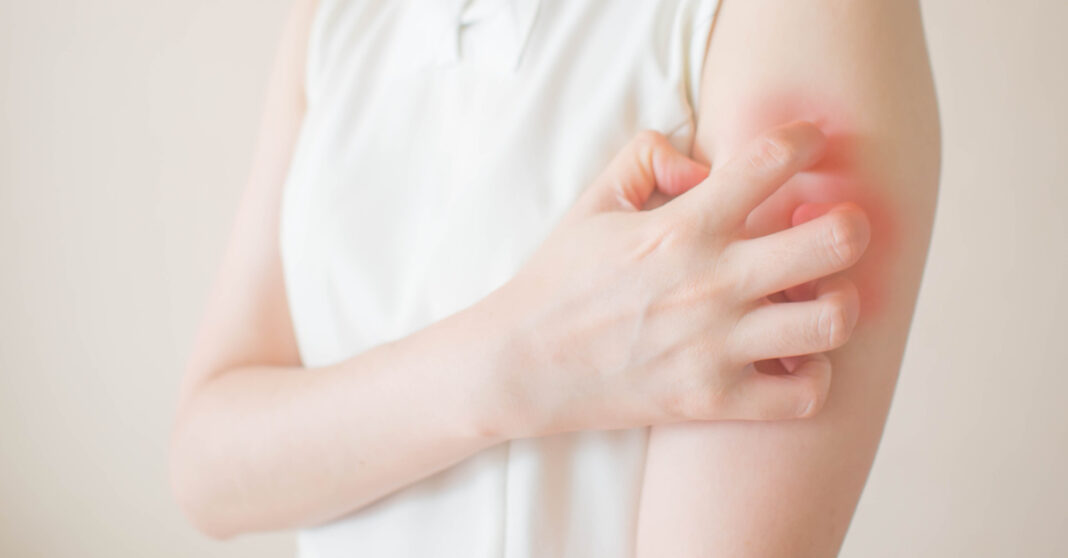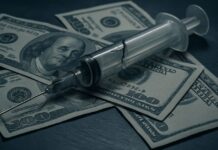Hold my hand while we go for a walk… and then I’ll tell you where we are going, and why!
A man called Alan Titchmarsh is a pretty big cheese on English TV. He started out as a TV celebrity gardener and was very good. Eventually he got an amusing gig called Ground Force, in which he revealed his incredible sense of humor.

Alan Titchmarsh is these days rightly considered a UK “national treasure”!
That was no doubt a factor in him getting to become a TV presenter. I followed his career, because I love gardening, and eventually Alan got to head up a major BBC lunchtime non-gardening initiative called “Pebble Mill At One” (Pebble Mill was the BBC headquarters in Birmingham but shown nationally across Britain).
So I was quite impressed when I was invited on to his show, to explain about food allergies. We had a feature case, a delightful lass called Josie, who had been the center of media attention that week, because I had found and proven that she got drunk (yes, intoxicated) eating potatoes.
Not so weird, I had plenty of cases like that; different foods, of course. As I explained to Alan on air, a food allergen will act like a toxin and if it poisons certain parts of the brain, like alcohol does, a person will be first stimulated (like somebody inebriated or silly) and then pass out (drunk under the table, as we say), as it gets worse.
We did nearly an hour of live TV on this theme.
With me so far?
Well, Alan has a great new TV series called “Love Your Weekend”, on Sunday mornings. And it so happens I can get the program on my French TV. Once again, it’s a magazine format and his guests are many, varied and interesting.
BUT—and a big BUT (no sniggering at the back)—I am dismayed to find the chief sponsor for his program is Jeyes Fluid, the chemical firm.*
Not just that but their ad slogan is “clean space, clear mind”. THAT I strongly object to; it’s a lie (and now we’ve arrived at our destination):
Chemicals do NOT and never will = clear mind. I have had thousands of patients knocked silly by ambient chemicals in the environment, to the point of not being able to think straight. I’m going to stand up for them.
I was one of the first pioneers among doctors finding and treating patients with environmental chemical sensitivity (ECS). In time it became obvious that some individuals were sensitive to environmental chemicals. It is hard to describe this as an allergy; probably the term ‘low-grade poisoning’ would be better since many of these chemicals would make anyone exposed to them in sufficient concentration feel ill.
The problem is just that certain individuals react to smaller doses. We are all subject to a barrage of alien chemicals in our bodies (Greek word: xenobiotics, meaning alien to life). We have chemical pathways in our bodies designed to remove toxic substances: a process called detoxication or more correctly biotransformation. The trouble is these new man-made chemicals have no equivalent in nature and so we do not have the right systems in our body to fully eliminate the toxicity. In fact, in its attempts to deal with the problem the body sometimes, by mistake, actually coverts these xenobiotics into something even more toxic1
It’s a self-perpetuating problem, since the alien chemicals can poison the enzyme pathways that are there to remove them. The result is that sick and sensitive people get sicker and sicker. Pioneer UK psychiatrist Richard Mackarness christened these patients “chemical victims.”2
The media used extreme phrases like “allergic to the twentieth century” and there is no doubt that for these sufferers, our modern techno-chemical society is a nightmare. Increasing numbers of people simply cannot accommodate the everyday load of ambient chemicals and it begins to undermine their health in many unsuspected ways.
In my radical 1986 book Allergies: What Everyone Should Know (London, Unwins) I introduced the term “human canaries”. The phrase seems to have caught on. This likens chemically sensitive people to the canaries taken down mines in olden days. If the bird fell dead it meant that the air was dangerous and a warning to humans to get out fast. It seems to me that we have many human canaries today but few people are heeding the warnings.
Let me give just one case example: a very pleasant lady who simply could not cope with fabric treatment chemicals. She would go in to a clothing shop and before she had walked 10 paces, she would forget why she was there! So she would pick a pair of cheap panties, pay and leave, thoroughly humiliated.
She probably had more pairs of knickers than Imelda Marcos had shoes!
Overload
The phenomenon of chemical overload and the chemically-sensitive patient is one that we have created for ourselves with our advanced lifestyle. Toxic volatile chemicals, such as benzene, formaldehyde, methacrylate, tetrachloroethylene, toluene, xylene, naphthalene, phthalates and styrene, can come from many sources in the home (this particular list of substances are all given off by new carpets).
Then there are more chemicals at work; some are recognized occupational hazards and strictly controlled, but the majority are not considered “occupational”: photocopy fluid, glues, plastics, paper treatments, inks, dyes, fabric treatments, flame-proofing, and so on.
I particularly object to the concept of spoofily-named “air fresheners”, when all they do is add more chemicals to the air, in an attempt to disguise existing contaminants. It is rather like taking dirty trench water to wash away stains — “Not logical”, as Mr. Spock (Leonard Nimoy, not Dr. Spock the pediatrician) would have said.
In my view it is unarguable that we will all go under if we don’t soon start to reduce the total chemical load in our environment. This is not merely green politics but an out and out survival issue. There is dirty work afoot and that, of course, means Big Business dollars getting in on the act and perverting truth. We are told we need most of this chemical junk, that pesticides “save lives” and “help grow more crops”, which we need to feed the planet, and so on.
I am not in the agribusiness, I’m a doctor. My take on this is very simple and very blunt: the word “pesticide” is a con trick. Plant and animal physiology does not recognize human value judgements, such as “useful” and “nuisance” life forms. The correct word is biocide, which means that it kills any life (including us), not just pests.
And there’s another con trick the spin merchants work on us: the idea of “responsible” or “controlled use” of toxic substances and talk of “reducing” usage levels is meaningless and dishonest: chemicals in the environment persist. Last year’s output is added to that of the year before, to this year’s, next year’s and so on. It’s cumulative.
There are already enough xenobiotic substances in our environment, working their way through the water table and eco-system, to keep us all sick for decades, even if output was curtailed tomorrow, which you will agree is a pretty unlikely event in any case.
Sorry Alan, for this outpouring. I love you and your sense of humor. I listen in rapt awe when you talk about plants. But pick your backers more carefully, please! They are trying to piggy-back you to get the “green” ticket!
To your good health,
Prof. Keith Scott-Mumby
The Official Alternative Doctor
References:
1. Casarett and Doull’s Toxicology. Basic Science of Poisons. Third Edition, Editors: Klaasen CD, Amdur MO, Doull J, Macmillan, New York 1986.
2. Mackarness R. Chemical Victims, Pan Books, London, 1980.
*Footnote: Jeyes Fluid is a brand of disinfectant, patented by John Jeyes in 1877, and granted a Royal Warrant to the British Royal Family in 1896. While no longer used for this purpose, Jeyes Fluid has been used in historical medical treatments: patients were once bathed in water with Jeyes Fluid added, as an antiseptic treatment. It contains chlorocresol (ugh!), tars, phenols and iso-propyl alcohol (batty Hulda Clark would turn over in her grave!)




